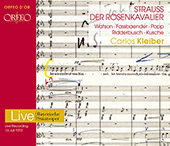Karl Ridderbusch
Karl Ridderbusch studied to become an engineer, with the intention of working in the brick works owned by his father. When he entered an amateur singing competition organized by the Herzog Film Company in Düsseldorf however, he was heard by the tenor Rudolf Schock, who immediately recognized his natural talent. Schock paid for further study: Ridderbusch enrolled at the Folkwang Music High School in Essen where he was a pupil of Clemens Kaiser-Breme. He made his operatic stage debut in 1961 at Münster, Westphalia, where his roles included Philip II / Don Carlo and the Commendatore / Don Giovanni. Between 1963 and 1965 he was a member of the Essen Opera where he extended his repertoire to include many of the major bass roles of Verdi, Wagner and Richard Strauss.
In 1965 Ridderbusch joined the Deutsche Oper am Rhein (serving both Düsseldorf and Duisberg); this was henceforth to be his base. Significant early roles here included Henry VIII / Anna Bolena, the title role in Boris Godunov, Hunding / Die Walküre and Sparafucile / Rigoletto. Soon he was appearing as a guest in many major European opera houses, including Vienna, Berlin, Frankfurt, Munich and Hamburg. In 1967 Ridderbusch made his debut at the Paris Opera as King Mark / Tristan und Isolde and also at the Bayreuth Festival, where he was a permanent fixture until 1977. His Bayreuth roles included Titurel / Parsifal (1967, 1969–1972, 1975–1977), Fasolt / Das Rheingold (1967– 1975), King Henry / Lohengrin (1967–1968, 1971–1972), Pogner / Die Meistersinger von Nürnberg (1968–1970, 1975), Daland / Der fliegende Holländer (1970–1971), Hunding (1970–1976), Hagen / Götterdämmerung (1970–1977), Hans Sachs / Die Meistersinger von Nürnberg (1973–1975) and King Mark (1975–1977).
Having made his American debut in 1966 at Dallas, where he sang Sarastro / Die Zauberflöte, Ridderbusch first appeared at the Metropolitan Opera, New York in 1967 as Hunding with Karajan conducting. He returned in the same role and also as Fafner / Das Rheingold in 1968 and 1969. His final appearance at the Met was a single performance as Hans Sachs in 1976. Ridderbusch made his debut at the Royal Opera House, London in 1971 in Der Ring des Nibelungen, singing Fasolt, Hunding and Hagen, returning in 1973 as the Landgrave / Tannhäuser. He was a regular member of Karajan’s Salzburg Easter Festival ensemble from 1967 onwards, his most distinguished performance there probably being his 1974 Sachs. Guest performances took him to La Scala, Milan, the Rome Opera, the Teatro Colón, Buenos Aires and the Chicago Lyric Opera, as well as the Deutsche Oper Berlin, Mannheim and Stuttgart. He returned to the Paris Opera as Baron Ochs / Der Rosenkavalier in 1978, the year in which he was made a Kammersänger by the Vienna State Opera.
Apart from those already mentioned, Ridderbusch’s other roles included Rocco / Fidelio, Caspar / Der Freischütz and Kecal / The Bartered Bride. During the latter part of his career he expanded his repertoire further to include Gurnemanz / Parsifal, singing this at Turin (1982), Cologne (1983) and Rome (1984); The Doctor / Wozzeck (Munich, 1982; Madrid, 1987); Podesta / Die Gezeichneten (Schreker) (Düsseldorf, Vienna Festival, 1989) and Falstaff / Die lustigen Weiber von Windsor (Düsseldorf, 1991).
Ridderbusch was an extremely large man who dominated the stage with his physical presence. In the earlier part of his career his voice possessed a fabulously soft-grained quality which gave his interpretations great distinctiveness. Regrettably wear and tear took its toll and by the mid-1970s his voice began to lose this quality, although this change was to some extent offset by his dramatic mastery. His death was the result of a severe heart condition allied to liver disorder.
© Naxos Rights International Ltd. — David Patmore (A–Z of Singers, Naxos 8.558097-100).























